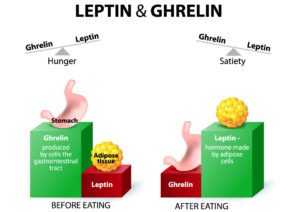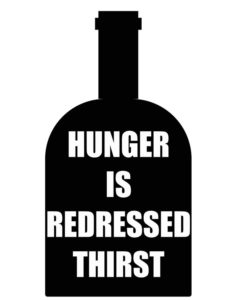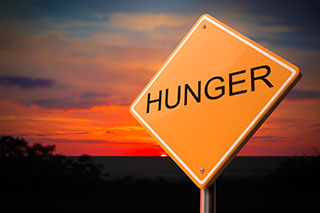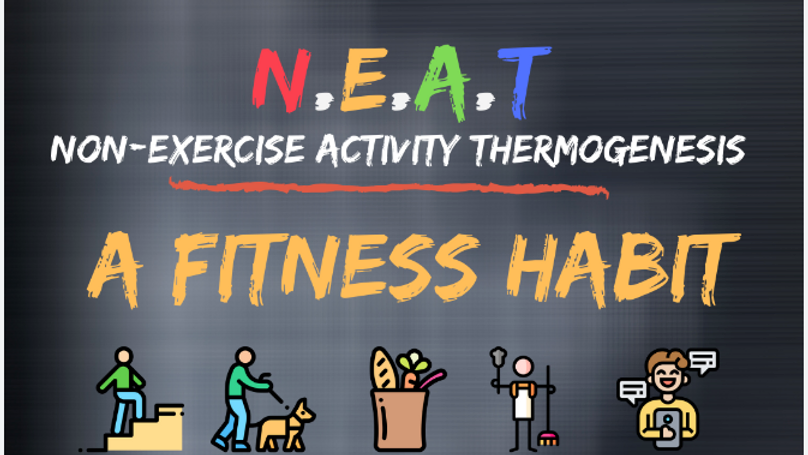It is well known that hunger is a common complaint after weight loss surgery. Bariatric surgery induces changes in various metabolic hormones such as Gherlin, Leptin, Gastrin, and Insulin. These hormonal changes have a long-term effect on energy expenditure and the sense of hunger and satiety. Still, as human beings, life and survival depend on the ability to find food for immediate metabolic needs and to store excess energy in the form of fat to meet metabolic demands during fasting. Hunger and satiety continues to be a fundamental body mechanism after surgery and is critically guided by the brain reward system.

Yes! There is still a gut-brain interplay controlling your eating behavior. Stomach hunger, or physical hunger, involves a complex interaction between the digestive system, endocrine system and the brain. The brain detects alterations in energy stores and triggers metabolic and behavioral responses designed to maintain energy balance.
After bariatric surgery, is important to understand your body, the foods you like, the ones that you have control over, and your triggers. It is also important to understand your physical feelings of hunger and satiety. Listen to your body and respond to it. Remember that the pleasure and rewarding feelings from eating affect the ultimate deciding factor of what kind of foods and how frequently you eat.
Hunger Explained

The stomach starts to ache and rumble in early signs of hunger. You start feeling tired and weak, while finding it harder to concentrate and work. When you begin eating in response, you really enjoy the food and start feeling better, because a bodily need is being met.
If you don’t feed your body when it needs food, the physical symptoms intensify. The stomach starts to really hurt. You find it more difficult to concentrate and may experience lightheadedness. You may also get irritable and short-tempered. In addition, some people get shaky and nervous, while others get a headache. Because you are so ravenous at this point, once you do start to eat, you’re very vulnerable to uncontrolled eating.
While eating, learn to stop when the stomach feels comfortable, and satisfied–not stuffed. You soon begin to feel calmer, more alert and energized. It takes approximately 20 minutes for fullness signals to transmit from the stomach back to the brain. You may experience a runny nose, watery eyes, hick-ups, sneeze, or a deep sigh.

If overeating occurs, you are mechanically taking bites and swallowing, but you aren’t really enjoying the food anymore. You are feeling pressure and discomfort in your stomach. If filled further, it starts to hurt. You may even feel queasy and after a while you start to feel sluggish. You may also experience heartburn, nausea, or vomiting. Avoid overeating.
Food tastes different
Taste adjusts while you eat just like hunger and thirst. It takes only a few bites for your taste buds to adapt. If you take two, three, or four bites of food and pay attention, you’ll notice that it rapidly gets less tasty, less satisfying, and less crave-worthy. Your taste buds are usually the first part of your body to start sending the “had enough” signal.
Pay attention on how your stomach feels
The stomach isn’t by your belly button. It’s higher behind your ribcage. For most people, the feeling of fullness is more like a pressure or tight feeling and happens just behind the bottom of the sternum, behind the little indentation between your belly and your chest. In the first few weeks after surgery, you may feel the pressure up in your chest area.
Do Not Skip Meals
 Eat 3 times/day within your waking hours. Long periods of fasting when skipping a meal can trigger hunger.
Eat 3 times/day within your waking hours. Long periods of fasting when skipping a meal can trigger hunger.
Follow Your Eating and Drinking Routine
Remember to stop drinking 30 minutes before your meal, do not drink while eating, and wait 30 minutes after you are done eating to drink fluids again.
Drinking fluids while eating or right after your meal will empty your stomach quickly. This means you will feel hungry sooner. This in turn will lead to snacking/grazing affecting your weight loss success.
 Helpful Tool: Download the Baritastic App. It has reminders, a 30 min timer, and many other tools to help you succeed. The Bariatric Center of Kansas City has downloaded additional resources and helpful links on the app as well. Add code: 76319. Yes, it is free!
Helpful Tool: Download the Baritastic App. It has reminders, a 30 min timer, and many other tools to help you succeed. The Bariatric Center of Kansas City has downloaded additional resources and helpful links on the app as well. Add code: 76319. Yes, it is free!
Focus on Eating Solid Foods
Solid foods will remain in your stomach longer. This will make you feel full and satisfied for a longer period of time. Avoid drinking your calories.
Other Body Signs Unrelated to Physical Hunger

Teeth Hunger
Sometimes, especially if we’re feeling irritated or stressed, you want to chew frustrations away. Your body is not calling for food, but you eat in an attempt to relieve anxiety.
Mouth Hunger
You see or smell something that looks so delicious that your mouth starts to water. Sometimes just thinking about a food brings on a craving for it. You desire to taste the food, but really aren’t physically hungry.
Mind Hunger
You look at the clock and think you have to eat a certain amount of food because “it’s time”, even if you don’t feel like eating.
Thirst

Sometimes the sluggishness of dehydration can be confused with actual hunger. The body is calling for fluids, not food.
Fatigue
When you sense low energy levels you automatically think that if you eat something you will feel better. However, if you’ve been working extra hard and/or haven’t been getting enough sleep, your body is calling for rest, not food.
Heart Hunger/Emotional Hunger
You feel an ache and emptiness in your hearts due to unmet emotional and/or spiritual needs. Rather than acknowledge your feelings and work through your issues, you try to fill the void with food. You may try to use food to “stuff” your feelings down. Although there can be physical discomfort in the gut when you’re upset, it is a distinctly different sensation from stomach hunger.
When you learn to be in synchrony with your body, understand your strengths and weaknesses, and make the most of them, you just might recognize that what you have eaten is simply enough.
KC Bariatric Admin
http://www.sciencedirect.com/science/article/pii/S0196978115002454
https://www.ncbi.nlm.nih.gov/pmc/articles/PMC3761859
https://www.ncbi.nlm.nih.gov/pmc/articles/PMC2710609
http://www.findingbalance.com/articles/understanding-hunger-and-fullness-cues
Additional credit to:
Experience Life, April 2017. The Art of Enough by Elizabeth Millard.









